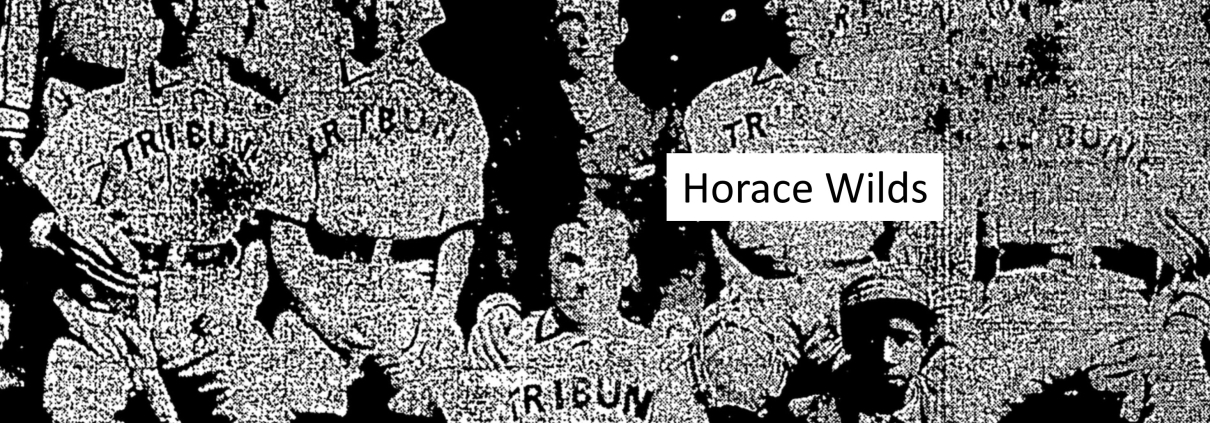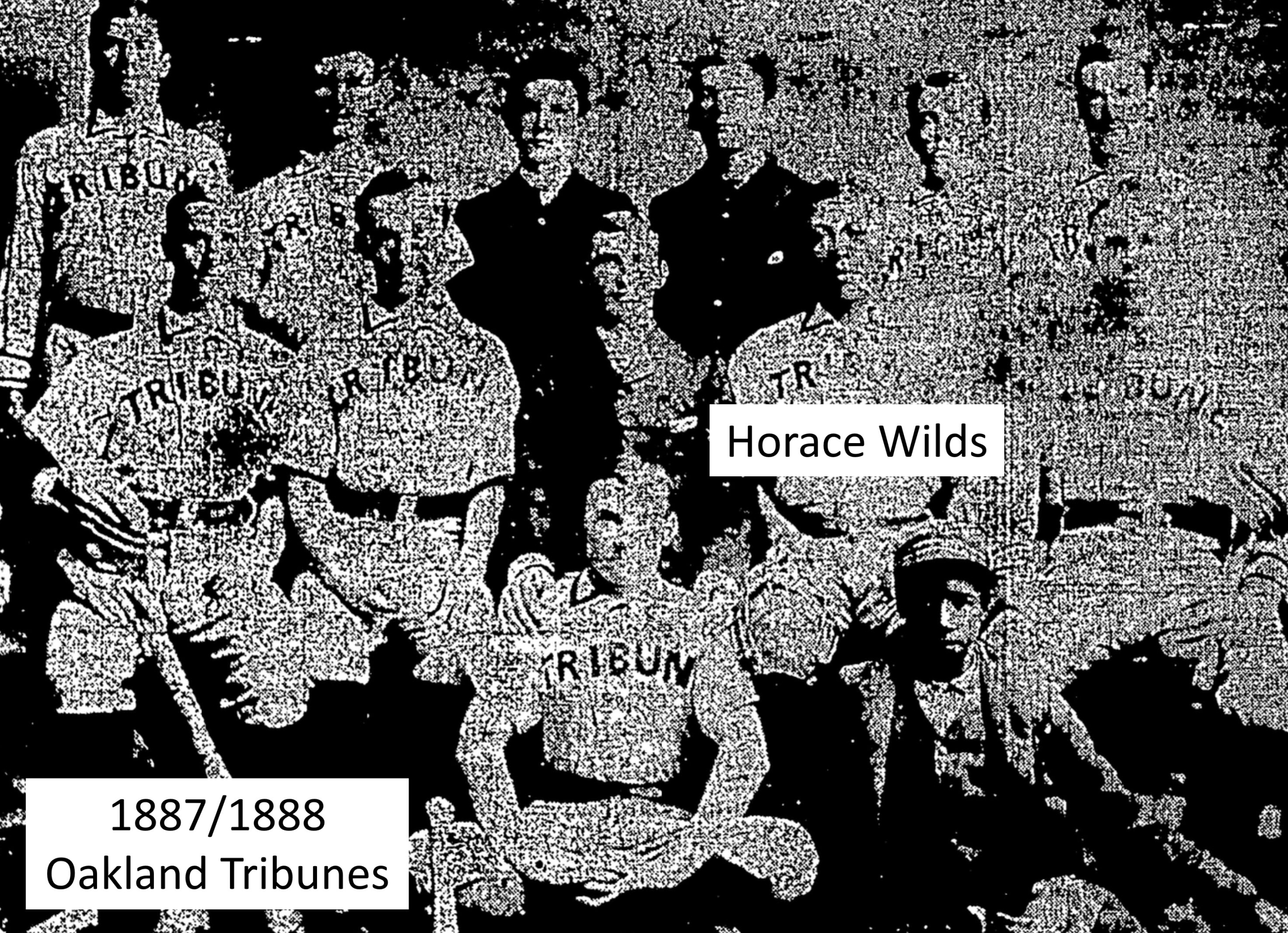Horace Wilds
Horace Wilds is pictured in the middle row, second from right, in a photo of the 1887-88 Oakland Tribunes baseball team published in the Oakland Tribune newspaper on September 6, 1908. (Courtesy of Stephen V. Rice)
Horace Wilds, an African American catcher, excelled on white semipro teams in Oakland and San Francisco from 1886 to 1897. In 1888, the San Francisco Examiner called him “one of the finest backstops on the Coast.”1
Born in Tennessee in 1867, Horace Maynard Wilds was the eldest of five siblings.2 Their parents, John and Elizabeth Wilds, had been born into slavery. In 1874 John moved his family to Oakland, California, and he worked for 33 years as janitor at Oakland’s City Hall, from 1879 until his retirement in 1912.3 An esteemed leader of Oakland’s African American community, John founded and edited the Oakland Sunshine, a weekly newspaper “aimed to inspire the Negro people to advance and contend for their rights as American citizens.”4 Naturally, he wanted his children to be educated. As a 19-year-old, Horace served as the recording secretary of the Oakland Literary and Aid Society, an organization that hosted “Lectures, Debates and other Literary Exercises.”5
But Horace was more interested in baseball than in literary pursuits. In 1886 he was a catcher on the Mystics of Oakland. In a game at Sacramento on September 12, 1886, he was “the first colored catcher ever seen there,” said the Oakland Tribune.6 He was touted in advance by an advertisement in the Sacramento Record-Union: “Wilds, the Great Colored Catcher, will make his first appearance in Sacramento.”7
For the next three years, Wilds was a member of the Tribunes, a team representing the eponymous newspaper. Home games were played at the Oakland Baseball Grounds at 14th and Center Streets, three miles from the Wilds family home at 1008 Tenth Avenue. In the spring of 1888, the Tribunes’ uniforms matched those worn by the 1887 Chicago White Stockings of the National League: dark navy blue suits with white stockings and white caps.8
As part of the research for this biography, box scores were located in the archives of Newspapers.com. In games for which box scores were found, the Tribunes achieved a 31-14 record 1887-89. All but one of these contests were played on Sundays. Wilds batted .246 in these 45 games. By contrast, his teammates batted .209 and opponents hit .190. The most frequent opponents were the Clevelands of Oakland, the Altas of Sacramento, and the Dolphins of Santa Cruz.
Wilds was a fan favorite.9 A left-handed batter10 (and probably a right-handed thrower), he was described as big and brawny.11 According to voter registration records, he stood about 6’1”. You have to be a tough guy to be a catcher, and this was especially true in the nineteenth century when protective equipment was minimal. “The Tribunes have a great catcher in Horace Wilds,” said the Sacramento Bee in 1888. “They say he is the only catcher that can handle [pitcher] Hyde’s terrible delivery.”12 John “Phenomenal” Hyde, the Tribunes’ ace, delivered a blazing fastball.13 The Oakland Tribune characterized Wilds’s work behind the plate as “noble.”14 He was also a gentleman who “very much objected” when his teammates used foul language.15
Wilds and pitcher Jack Rohan were batterymates on a Vallejo, California, team in the spring of 1890. They were accused of “throwing” a game to a rival squad from Santa Rosa and were released.16 The Tribune came to their defense: “The charge was entirely without foundation, as both Wilds and Rohan had money bet that the Vallejos would win the contest.”17
From August 1890 to November 1891, Wilds played for the Burlingtons of San Francisco. In 30 games for which box scores were located — all Sunday games, the team compiled a 12-18 record. Wilds batted .286 while teammates hit .199 and opponents batted .234. Perhaps the best offensive day of his career came on August 23, 1891, in San Francisco; he slugged two home runs and a triple in the Burlingtons’ 20-9 rout of the Flavins.18
In a California League game on October 19, 1890, at the Haight Street Grounds in San Francisco, Wilds filled in for Stockton against the Oakland Colonels. He had already played a morning game for the Burlingtons at the Grounds. The Stockton catcher missed the train, and Wilds was asked to take his place in the afternoon contest. Oakland prevailed, 5-3, in 13 innings. The pitchers, Mike Kilroy for Stockton and Kid Carsey for Oakland, went the distance. Wilds “caught Kilroy like a veteran” and “on his only chance to throw to second he nailed his man,” reported the San Francisco Examiner.19
At Vallejo on November 15, 1891, the Burlingtons added some major league talent to their lineup: George Van Haltren and Lou Hardie of the Baltimore Orioles. Hardie was a catcher, so Wilds moved to left field to accommodate him. Vallejo batted in the ninth inning trailing by a run. A batter drew a walk and stole second base, and the next batter lifted a long fly that was muffed by Wilds in left field. The San Francisco Chronicle described what followed: Wilds threw the ball “from deep left to home, and even then threw it twenty feet over [catcher] Hardie’s head. The ball struck the grand stand, and as it bounded away a little water spaniel caught it in his mouth and ran off with it. Hardie and the other fielders chased the dog” as the baserunners came home with the tying and winning runs.20
In 1892 Wilds was a catcher on the Oakland team in a newly formed Central California League.21 He homered and tripled in Oakland on Opening Day, April 17, in a 9-7 victory over the Haverlys of San Francisco.22 Beginning in 1893, he played mostly at first base and in the outfield. Among the teams he played for were the Petalumas (1893), the Pacifics of San Francisco (1895-96), and the S.N. Woods of San Jose (1897). These were white semipro teams. Research found only one report of Wilds playing for a Negro team: on August 11, 1895, he was the catcher for a San Francisco team referred to as the Assembly Club.23
Wilds married Joanna Dickson on August 10, 1892, and she bore him two children, daughter Constance in 1893 and son Maynard in 1895.24 Sunday baseball was an avocation for Wilds. He worked as a potter, janitor, and railroad porter. He moved from Oakland to San Francisco about 1894.
In 1895 Wilds was beaned in a game at San Francisco. “He was struck accidentally on the left side of the head while preparing to take his place at the bat. The pain did not annoy him much and he paid little attention to it, although it recurred occasionally.”25 But in 1901, the pain intensified, and he became blind and paralyzed. He had a brain tumor.26 One may conjecture (as the San Francisco Call did then) that the head trauma and tumor were correlated; subsequent long-term studies of this relationship are inconclusive.
At age 34, Horace Wilds passed away at his father’s home in Oakland on February 7, 1902. He was interred at the Mountain View Cemetery in Oakland.27
Acknowledgments
This biography was reviewed by Bill Nowlin and Norman Macht and fact-checked by Kevin Larkin.
Sources
In addition to the sources in the Notes, the author also consulted Ancestry.com and Newspapers.com, accessed August 2020.
Notes
1 “Amateur Cullings,” San Francisco Examiner, September 24, 1888: 6.
2 1880 US Census.
3 “Oldest City Employee to Retire on Pension,” San Francisco Call, July 17, 1912: 5.
4 Delilah L. Beasley, The Negro Trail Blazers of California (Los Angeles, 1919), 261.
5 “Literary and Beneficial,” The Elevator (San Francisco and Oakland), September 11, 1886: 2.
6 “Diamond Dust,” Oakland Tribune, September 13, 1886: 3.
7 Sacramento Record-Union, September 11, 1886: 8.
8 “Local Intelligence,” Sacramento Record-Union, May 7, 1888: 3. See Threadsofourgame.com/1887-chicago/.
9 “To-morrow’s Sport,” Sacramento Record-Union, June 30, 1888: 5; “Coming Ballplayers,” San Francisco Examiner, April 29, 1889: 4.
10 “Stray Hits,” Oakland Tribune, May 9, 1888: 3.
11 “Frisco Still in the Lead,” San Francisco Call, October 20, 1890: 8.
12 “The Diamond Field,” Sacramento Bee, April 24, 1888: 4.
13 “Stray Hits,” Oakland Tribune, September 7, 1887: 4.
14 “Stray Hits,” Oakland Tribune, September 5, 1888: 3.
15 “Baseball,” Santa Cruz Surf, May 21, 1888: 8.
16 “Local Briefs,” Napa (California) Register, May 16, 1890: 1.
17 “The Umpire,” Oakland Tribune, June 4, 1890: 6.
18 “Amateur Contest,” San Francisco Call, August 24, 1891: 8.
19 “They All Played Ball,” San Francisco Examiner, October 20, 1890: 5.
20 “Baseball News,” San Francisco Chronicle, November 17, 1891: 5.
21 “The Central California League,” San Francisco Chronicle, April 9, 1892: 3.
22 “The Central League,” San Francisco Examiner, April 18, 1892: 8.
23 “Colored Clubs Play Ball,” San Francisco Chronicle, August 12, 1895: 2.
24 “Married,” San Francisco Examiner, August 12, 1892: 7; 1900 US Census.
25 “Injury Finally Causes Death,” San Francisco Call, February 8, 1902: 4.
26 Alameda County, California, death record at Ancestry.com.
27 “Horace Wilds Was Laid to Rest Yesterday,” Oakland Tribune, February 10, 1902: 8.
Full Name
Horace Maynard Wilds
Born
, 1867 at , Tennessee (US)
Died
February 7, 1902 at Oakland, CA (US)
Stats
If you can help us improve this player’s biography, contact us.



